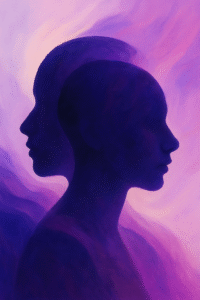

Medicine-Assisted Therapy in Australia
Note: Access to medicine-assisted therapies in Australia is tightly regulated under the TGA’s Authorised Prescriber Scheme. This article is for educational purposes, not medical advice.
There’s been a lot of talk lately about new approaches to mental health treatment; you’ve probably seen headlines about breakthrough therapies or heard podcasts discussing the research. But if you’re actually considering whether these approaches might be relevant to your mental health journey, you likely have practical questions about what they are, how they work, and whether they’re even available in Australia.
At Unison Mental Health we’re watching these developments closely. Not because we’re chasing trends, but because we’re committed to expanding options for people whose struggles with anxiety, depression, trauma, or PTSD and haven’t responded well to conventional approaches.
What Is Medicine-Assisted Therapy?
Medicine-assisted therapy (sometimes also known as psychedelic-assisted psychotherapy) is a broad umbrella term for therapeutic approaches that use mind-altering substances as part of a structured treatment process. These include medications like psilocybin (derived from certain mushrooms), MDMA (also known as ecstasy in recreational contexts), and ketamine (a commonly used dissociative). What distinguishes medicine-assisted therapy from simply taking medication is the integration of these substances within a carefully designed therapeutic framework, rather than as standalone pharmaceutical treatments.
The process involves much more than just taking a substance and seeing what happens. Under the supervision of qualified clinicians, clients undergo guided preparation sessions, the medicine session itself, and then, crucially, integration sessions afterwards. The preparation helps you understand what to expect and creates a framework of safety. The integration is where you make sense of the experience and translate any insights into meaningful changes in your life.
Research shows promising results for treatment-resistant depression, PTSD, end-of-life anxiety, and certain other conditions. In addition, some studies report significant symptom reduction that persists months after treatment. But it’s worth noting that the research is still relatively new, sample sizes are often small, and we’re learning more about who benefits most and under what circumstances.
The Australian Context
Australia took a bold step in 2023 by allowing psychiatrists to prescribe psilocybin and MDMA for specific conditions under the Therapeutic Goods Administration’s Authorised Prescribers Scheme. Two years on, access remains limited. The treatments are expensive, not yet covered by Medicare, and require specialised training that few clinicians currently have. There are also legitimate concerns about safety protocols, the need for more diverse research participants, and ensuring these treatments don’t become yet another resource available primarily to the wealthy.
However, if you’re exploring this option, it’s important to know that availability is patchy and the landscape is still evolving. Some private clinics offer these services, but costs can run into thousands of dollars. For most people seeking this treatment, it will mean navigating a complex system with limited guidance and significant financial barriers.
Ketamine therapy operates somewhat differently. It’s already available through certain clinics in Australia for treatment-resistant depression and can be prescribed more readily than psilocybin or MDMA. However, the therapeutic protocols and settings vary widely, and it’s important to understand what kind of support structure comes with any ketamine treatment you’re considering.
Who Might Consider This Approach
At Unison, we work with people whose experiences often don’t fit neatly into standard treatment categories. You might be someone who’s tried multiple therapies and medications without lasting relief. Perhaps you’re navigating complex trauma that feels intellectually understood but emotionally stuck. Maybe you’re part of a marginalised community—LGBTQIA+, neurodivergent, practising non-traditional relationships—and you’re looking for approaches that honour the fullness of your experience rather than trying to fit you into a predetermined box.
Medicine-assisted therapy isn’t appropriate for everyone. People with certain mental health conditions, particularly psychosis, bipolar I and II or some personality disorders, may face increased risks. Therefore, a thorough screening process is essential. There are also considerations around physical health, medication interactions, and whether you have adequate support systems in place for the integration work that follows.
The other reality is that this work is emotionally demanding. Even when the medicine session goes well, the integration process requires time, energy, and often ongoing therapeutic support. It’s not a shortcut around the hard work of healing; it’s a different way of engaging with it.
The Underground: Why We Don’t Recommend It
Given the cost and limited availability of legal medicine-assisted therapy in Australia, some people consider seeking out underground practitioners: guides or facilitators operating outside the regulated system. We understand the appeal, especially when you’re struggling and conventional treatments haven’t helped, but we strongly discourage this path, and the reasons go beyond just legal concerns.
The lack of regulatory oversight in underground settings creates serious safety risks. Recent research indicates that approximately 8% of people using these medicines with guides report experiencing inappropriate sexual contact (some indications are that this percentage is much higher). The vulnerability inherent in altered states of consciousness—where boundaries can feel dissolved and trust is heightened—creates conditions where exploitation can occur more easily. High-profile cases, including documented instances of misconduct even within clinical trial settings, underscore these risks.
Underground practitioners have no professional accountability, no standardised training requirements, and no licensing boards to answer to if something goes wrong. You can’t verify their credentials, and you have limited recourse if you’re harmed. There are no quality controls on the substances being used, no emergency protocols, and often inadequate screening for medical or psychiatric contraindications that could make these medicines dangerous for you specifically.
The power dynamics in these settings can be particularly problematic. When you’re in a highly vulnerable psychological state during a medicine session, you’re trusting another person in ways that require significant safeguards. In clinical settings, there are ethics committees, supervision structures, and clear professional boundaries. Underground settings typically have none of these protections.
Beyond the direct risks during sessions, there’s also the matter of integration support. If you have a difficult experience or uncover traumatic material, will the underground guide have the clinical training to help you process it safely? Can they recognise when something requires medical attention? Will they be available for ongoing support, or will you be left to make sense of a potentially destabilising experience on your own?
We also want to acknowledge the legal reality. Possessing and using most of these substances remains illegal in Australia outside of authorised clinical contexts. Beyond personal legal consequences, underground guides operate in ways that put both themselves and their clients at risk of prosecution, which can create additional stress and secrecy that isn’t conducive to healing.
Importantly, none of this is meant to shame anyone who has sought or is considering underground options. The lack of accessible legal alternatives is a real problem, and we recognise that desperation for relief is valid. But we believe people deserve to know the full picture of risks before making that choice.
What Makes Unison’s Approach Different
Our practice has always drawn on multiple modalities: mindfulness, emotion-focused therapy, schema therapy, trauma integration, and others. We’re interested in medicine-assisted therapy as a potential complement to these approaches, not a replacement for them. The therapeutic relationship you’ve built, the skills you’ve developed, the self-understanding you’ve gained—all of that remains valuable and forms the foundation for any additional work you might do.
If medicine-assisted therapy becomes more accessible and we begin offering it at Unison, it would be within the same trauma-informed, person-centred framework we use for everything else. That means careful assessment of readiness, informed consent that includes discussing both potential benefits and risks, and individualised support that respects your identity, history, and goals.
Moving Forward Thoughtfully
The field is changing rapidly. Guidelines are being developed, more research is underway, and conversations are happening about how to make these treatments more equitable and accessible. There’s genuine excitement about the potential, but also important questions about implementation, safety, and who gets left out of the narrative.
If you’re curious about whether medicine-assisted therapy might fit into your healing journey, start by having an open conversation with a therapist—at Unison or elsewhere—who understands both the promise and the limitations of this approach. They can help you assess whether it’s appropriate for your situation, what’s currently available, and what other options might serve you well.
Mental health care shouldn’t be one-size-fits-all. The fact that new possibilities are emerging is genuinely hopeful. But like any treatment, these approaches work best when they’re part of a broader commitment to understanding yourself, building supportive relationships, and doing the ongoing work of healing—whatever form that takes for you.
References and Further Reading
Research and Clinical Evidence
- Carhart-Harris, R. L., et al. (2021). Trial of Psilocybin versus Escitalopram for Depression. New England Journal of Medicine.
- Mitchell, J. M., et al. (2021). MDMA-assisted therapy for severe PTSD: a randomized, double-blind, placebo-controlled phase 3 study. Nature Medicine.
- Griffiths, R. R., et al. (2016). Psilocybin produces substantial and sustained decreases in depression and anxiety in patients with life-threatening cancer. Journal of Psychopharmacology.
Australian Regulatory Context
- Therapeutic Goods Administration. (2023). Change to classification of psilocybin and MDMA to enable prescribing by authorised psychiatrists.
- Conversation, The. (2025). Two years on from Australia’s bold psychedelic experiment: here are our concerns.
- RANZCP. Psychedelics: Information for psychiatrists.
Safety and Ethical Considerations
- Pilecki, B., Luoma, J.B., Bathje, G.J., et al. (2021). Ethical and legal issues in psychedelic harm reduction and integration therapy. Harm Reduction Journal.
- Davis, A. K., et al. (2025). Psychedelic Therapist Sexual Misconduct and Other Adverse Experiences Among a Sample of Naturalistic Psychedelic Users. Psychedelic Medicine.
- CBC News. (2021). As psychedelic therapy goes mainstream, former patient warns of danger of sexual abuse.
Organizations and Resources
- Psychedelic Research in Science & Medicine (PRISM) – Australian organisation supporting research in this field
- Multidisciplinary Association for Psychedelic Studies (MAPS) – International nonprofit research and educational organisation



